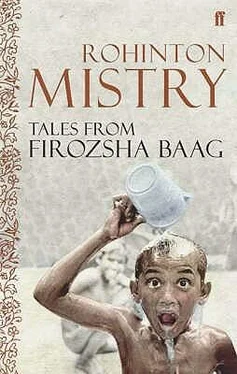Rohinton Mistry - Tales From Firozsha Baag
Здесь есть возможность читать онлайн «Rohinton Mistry - Tales From Firozsha Baag» весь текст электронной книги совершенно бесплатно (целиком полную версию без сокращений). В некоторых случаях можно слушать аудио, скачать через торрент в формате fb2 и присутствует краткое содержание. Год выпуска: 2006, Издательство: Faber & Faber, Жанр: Современная проза, на английском языке. Описание произведения, (предисловие) а так же отзывы посетителей доступны на портале библиотеки ЛибКат.
- Название:Tales From Firozsha Baag
- Автор:
- Издательство:Faber & Faber
- Жанр:
- Год:2006
- ISBN:нет данных
- Рейтинг книги:3 / 5. Голосов: 1
-
Избранное:Добавить в избранное
- Отзывы:
-
Ваша оценка:
- 60
- 1
- 2
- 3
- 4
- 5
Tales From Firozsha Baag: краткое содержание, описание и аннотация
Предлагаем к чтению аннотацию, описание, краткое содержание или предисловие (зависит от того, что написал сам автор книги «Tales From Firozsha Baag»). Если вы не нашли необходимую информацию о книге — напишите в комментариях, мы постараемся отыскать её.
Tales From Firozsha Baag — читать онлайн бесплатно полную книгу (весь текст) целиком
Ниже представлен текст книги, разбитый по страницам. Система сохранения места последней прочитанной страницы, позволяет с удобством читать онлайн бесплатно книгу «Tales From Firozsha Baag», без необходимости каждый раз заново искать на чём Вы остановились. Поставьте закладку, и сможете в любой момент перейти на страницу, на которой закончили чтение.
Интервал:
Закладка:
But the promises were always smothered by a fresh wave of reproaches awaiting him at home. If he managed to speak in the spirit of autonomy that she had inspired in him earlier in the evening, it still turned out unfavourably.
“See?” Mother would say with mournful satisfaction, “see how it proves my point that she is a bad influence? He goes to her and returns with such cruel words in his mouth. And who put them there, that is all I am asking. Because such words were not there before. Now I must start all over again to remove her effect on him. Then he will be more like the son I once knew. But how long can I go on like this, how long?” she would conclude dolefully, whereupon Jehangir abandoned the balance of his painstakingly prepared words.
He looked at his parents now, supporting each other as they slept through heat and dust. The photograph was in his wallet. They had told him to bring it along. He had taken it with her camera during the college picnic at Elephanta Caves. She later gave him a copy. It was a black-and-white, and as he gazed at it he could feel the soft brown of her eyes drawing him in, ready to do her will. The will of my enchantress, he liked to imagine.
Mother had taken to going through his trousers and wallet. He was aware of these secret searches but had said nothing, not wanting to add to her sorrow and to the bitterness that filled the house.
The day after he received the photograph, she triumphantly found it: “What is this, why must you carry her photo with you?”
“What right did you have to look in my wallet?”
“What right? What right, he says! To his own mother he says what right! A mother does not need any rights. A mother exercises her judgement out of love. A mother does whatever she knows is right for her son.”
The photograph was brought up constantly for days after, and with each passing day the rhetoric grew increasingly forceful and wildly inventive.
“It is not enough to see her makeup-covered face in the evening. He must also keep her photograph.”
“People have been made to go crazy by a photo with a magic spell on it. Maybe her parents are involved in this, trying to snare my son for their daughter.”
“She knows you will go to study in America one day and settle there. By thrusting her photo on you she is making sure you will sponsor her. Oh yes, it begins with a photograph.”
“Be careful you don’t forget your own mother’s face, you don’t have much time to see it these days.”
And always, the eight o’clock ultimatum: “Remember, the door will never open for you after eight o’clock.”
In the end Mother was glad to have the photograph. “One good thing she did by giving it to you. Now we have something to show Bhagwan Baba.”
The train braked in preparation for the approaching station. A kayrawalli climbed aboard to flop upon the floor with her basket of plantains. She mopped her brow with one corner of her sari, rubbed her eyes, and sat with drawn-up knees after administering a good scratching in some region under the sari-folds. Any minute now she’ll start badgering the passengers to buy her plantains, thought Jehangir. But she sat where she was, enervated, with no inclination to acquire business. Perhaps she did not dare to wake the slumbering people. In school they used to say that for a quarter rupee a kayrawalli would lift her sari and flash for you. For a rupee she would even perform with a plantain. He wondered if it was true.
The glass bangles on her wrists tinkled as the train swayed along and she fell asleep. The plantains in her basket looked bruised and battered, beginning to show black patches because of the heat. They would have to be thrown away if they remained unsold. Granny had a saying about eating them: a plantain in the morning turns to gold in the stomach and a plantain at noon is silver, a plantain in the evening turns to brass in the belly, but a plantain at night is iron in the gut.
He wondered why the kayrawalli was travelling away from the city and towards the suburbs. People like her brought fruit to the city. Maybe she was on the wrong train.
Just like Father and Mother and me. To think that I put the thought in their heads.
Once, in the midst of a bitter outburst, he had said, “Why don’t you ask your famous Bhagwan Baba if he also handles matchmaking? Maybe he’ll be in my favour.” He spoke with what he thought was biting sarcasm. Everything now had a habit of degenerating into a sarcasm contest.
But they liked the idea very much. “It was only a joke,” Jehangir pleaded, sarcasm retreating in alarm.
Mother and Father thought it was the best way to decide his future. They tried to convince him to make the visit. Mother was harshly dictatorial at first, then lachrymose and pleading. “What we want,” she tearfully entreated, “is for you to come and talk to Bhagwan Baba about the girl, to find out if she is right for you. Agree that Bhagwan Baba is never wrong, believe again as you believed once when you were younger.”
And Jehangir stopped objecting when reminded of the many miracles wrought within the world of his childhood. Miracles were no doubt easier to believe in that long ago world. But the memories began to prey on his notions of loyalty to the past, his nostalgia for a home happy and loving despite its material meagreness, and guilt for considering (however briefly) repudiation of Bhagwan Baba. Besides, he reasoned, he had nothing to lose, it could not get worse. If he was lucky, a favourable pronouncement would make things much easier.
And with the agreement to take Bhagwan Baba’s advice, a measure of calm returned to their lives. Hostilities were suspended and the harsh words temporarily silenced.
The kayrawalli awoke and balanced the basket of plantains on her head. She got off at the next station, which was also the one Jehangir and his parents were waiting for.
The medium-sized house had a spacious veranda at the front. A wooden bench sat on the veranda, and around the house a lush vegetable garden with several pumpkin vines and tomato plants. Tucked away in one corner was a large bench-swing, hanging still. Still, too, was the greenery in the garden. Not a breath of breeze.
A large crowd was waiting for Bhagwan Baba. People stood in a line leading up to the veranda, in silence or soft conversation, reverent hands clutching packets with offerings for Bhagwan Baba. There was none of the hysterical activity usually associated with holy men, no burning of incense, no chanting, no peddling of holy pictures or religious artifacts.
Jehangir’s parents explained that when Bhagwan Baba was ready he came out to the wooden bench. The visitors then went up to the veranda and sat with him, one by one or in a group if it was a group consultation.
A man just ahead of them in line overheard, and spoke up as though waiting for the cue: “There is nothing to worry about. Bhagwan Baba is wonderful. Whatever he will say or do, it is only for your own benefit.” Bhagwan Baba started granting audiences at eleven A.M. It was now eleven-thirty. With the air of one privy to special information the man said, “Bhagwan Baba knows best. If he is late it is for a good reason.” His hands performed practised gestures to embellish the earnestly devout speech: fingers bunched together to describe a vertical line in the air; right index finger wisely held aloft and lowered through an arc into the left hand; palms together in a clasp; and so on. “We are only simple human beings, so how to understand everything Bhagwan Baba will say or do, how to know why his spirituality is manifesting in one way and not in another?” He paused, then added unctuously, “For us, it is only to stand and wait till Baba is ready to mingle with poor souls like you and me!”
Читать дальшеИнтервал:
Закладка:
Похожие книги на «Tales From Firozsha Baag»
Представляем Вашему вниманию похожие книги на «Tales From Firozsha Baag» списком для выбора. Мы отобрали схожую по названию и смыслу литературу в надежде предоставить читателям больше вариантов отыскать новые, интересные, ещё непрочитанные произведения.
Обсуждение, отзывы о книге «Tales From Firozsha Baag» и просто собственные мнения читателей. Оставьте ваши комментарии, напишите, что Вы думаете о произведении, его смысле или главных героях. Укажите что конкретно понравилось, а что нет, и почему Вы так считаете.












